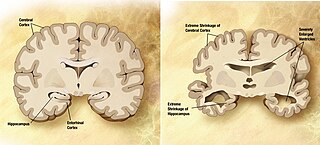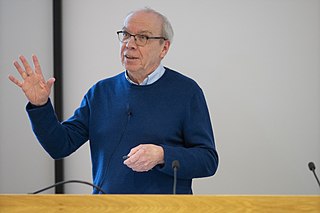
Frontotemporal dementia (FTD), also called frontotemporal degeneration disease or frontotemporal neurocognitive disorder, encompasses several types of dementia involving the progressive degeneration of the brain's frontal and temporal lobes. Men and women appear to be equally affected. FTD generally presents as a behavioral or language disorder with gradual onset. Signs and symptoms tend to appear in late adulthood, typically between the ages of 45 and 65, although it can affect people younger or older than this. Currently, no cure or approved symptomatic treatment for FTD exists, although some off-label drugs and behavioral methods are prescribed.

A neurodegenerative disease is caused by the progressive loss of neurons, in the process known as neurodegeneration. Neuronal damage may also ultimately result in their death. Neurodegenerative diseases include amyotrophic lateral sclerosis, multiple sclerosis, Parkinson's disease, Alzheimer's disease, Huntington's disease, multiple system atrophy, tauopathies, and prion diseases. Neurodegeneration can be found in the brain at many different levels of neuronal circuitry, ranging from molecular to systemic. Because there is no known way to reverse the progressive degeneration of neurons, these diseases are considered to be incurable; however research has shown that the two major contributing factors to neurodegeneration are oxidative stress and inflammation. Biomedical research has revealed many similarities between these diseases at the subcellular level, including atypical protein assemblies and induced cell death. These similarities suggest that therapeutic advances against one neurodegenerative disease might ameliorate other diseases as well.
Christine Van Broeckhoven is a Belgian molecular biologist and professor in Molecular genetics at the University of Antwerp. She is also leading the VIB Department of Molecular Genetics, University of Antwerp of the Flanders Institute for Biotechnology (VIB). Christine Van Broeckhoven does research on Alzheimer dementia, bipolar mental disorders and other neurological diseases. Since 1983 she has had her own laboratory for molecular genetics at the University of Antwerp, and since 2005 is focussing her research on neurodegenerative brain diseases. She is an associate editor of the scientific journal Genes, Brain and Behavior.
The Potamkin Prize for Research in Pick's, Alzheimer's, and Related Diseases was established in 1988 and is sponsored by the American Academy of Neurology. The prize is funded through the philanthropy of the Potamkin Foundation. The prize is awarded for achievements on emerging areas of research in Pick's disease, Alzheimer's disease and other dementias.
Sir John Anthony Hardy is a human geneticist and molecular biologist at the Reta Lila Weston Institute of Neurological Studies at University College London with research interests in neurological diseases.

Sortilin-related receptor, L(DLR class) A repeats containing is a protein that in humans is encoded by the SORL1 gene.
John Quinn Trojanowski was an American academic research neuroscientist specializing in neurodegeneration. He and his partner, Virginia Man-Yee Lee, MBA, Ph.D., are noted for identifying the roles of three proteins in neurodegenerative diseases: tau in Alzheimer's disease, alpha-synuclein in Parkinson's disease, and TDP-43 in Amyotrophic Lateral Sclerosis (ALS) and frontotemporal degeneration.
Early-onset Alzheimer's disease (EOAD), also called younger-onset Alzheimer's disease (YOAD), is Alzheimer's disease diagnosed before the age of 65. It is an uncommon form of Alzheimer's, accounting for only 5–10% of all Alzheimer's cases. About 60% have a positive family history of Alzheimer's and 13% of them are inherited in an autosomal dominant manner. Most cases of early-onset Alzheimer's share the same traits as the "late-onset" form and are not caused by known genetic mutations. Little is understood about how it starts.

Andrew B. Singleton is a British neurogeneticist currently working in the USA. He was born in Guernsey, the Channel Islands in 1972, where he lived until he was 18 years old. His secondary education was conducted at the Guernsey Grammar School. He earned a first class degree in Applied Physiology from Sunderland University and his PhD in neuroscience from the University of Newcastle upon Tyne where he studied the genetics of Alzheimer's disease and other dementias at the Medical Research Council (MRC) Neurochemical Pathology Unit. He moved to the United States in 1999, where he began working at the Mayo Clinic in Jacksonville, Florida studying the genetic basis of Parkinson's disease, ataxia, and dystonia. He moved to the National Institutes of Health in 2001 to head the newly formed Molecular Genetics unit within the Laboratory of Neurogenetics. In 2006 he took over as Chief of the Laboratory of Neurogenetics and became an NIH Distinguished Investigator in the intramural program at the National Institute on Aging (NIA) in 2017. In 2020 he stepped down as the Chief of the Laboratory of Neurogenetics and became the Acting Director of the newly formed Center for Alzheimer's and Related Dementias at the NIA. In 2021 he became the Director of CARD.

Michel Goedert FRS, FMedSci is a Luxembourgish-British neuroscientist and former Head of Neurobiology, at the MRC Laboratory of Molecular Biology.

C9orf72 is a protein which in humans is encoded by the gene C9orf72.
Maria Grazia Spillantini is Professor of Molecular Neurology in the Department of Clinical Neurosciences at the University of Cambridge. She is most noted for identifying the protein alpha-synuclein as the major component of Lewy bodies, the characteristic protein deposit found in the brain in Parkinson's disease and dementia with Lewy bodies. She has also identified mutations in the MAPT gene as a heritable cause for frontotemporal dementia.

The Krembil Research Institute, formerly known as the Toronto Western Research Institute, is an academic medical research institute in Toronto. It is one of the largest research institutes in Canada focusing on human neurological disease.
There are more than 25 genes known to be associated with amyotrophic lateral sclerosis (ALS) as of June 2018, which collectively account for about 70% of cases of familial ALS (fALS) and 10% of cases of sporadic ALS (sALS). About 5–10% of cases of ALS are directly inherited. Overall, first-degree relatives of an individual with ALS have a 1% risk of developing ALS. ALS has an oligogenic mode of inheritance, meaning that mutations in two or more genes are required to cause disease.

Rahul Desikan was an Indian-American neuroscientist and neuroradiologist. He was an Assistant Professor of Radiology & Biomedical Imaging, Neurology and Pediatrics at the University of California, San Francisco, and co-director of Laboratory for Precision Neuroimaging. Desikan's achievements became publicly known in a Washington Post article detailing his lifelong commitment to preventing and treating Alzheimer's disease and his continuing work as a scientist living with Amyotrophic lateral sclerosis (ALS). Desikan was vocal about the need for increased awareness and research funding for ALS, and voiced his unique perspective as both ALS researcher and ALS patient in op-ed articles appearing in a regular column in the Washington Post as well as in the San Francisco Chronicle and Scientific American.
Alison Mary Goate is the Jean C. and James W. Crystal Professor and Chair of the Department of Genetics and Genomic Sciences and Director of the Loeb Center for Alzheimer's Disease at Icahn School of Medicine at Mount Sinai, New York City. She was previously professor of genetics in psychiatry, professor of genetics, and professor of neurology at Washington University School of Medicine.
Bryan J. Traynor is a neurologist and a senior investigator at the National Institute on Aging, and an adjunct professor at Johns Hopkins University. Dr. Traynor studies the genetics of human neurological conditions such as amyotrophic lateral sclerosis (ALS) and frontotemporal dementia (FTD). He led the international consortium that identified pathogenic repeat expansions in the C9orf72 gene as a common cause of ALS and FTD. Dr. Traynor also led efforts that identified other Mendelian genes responsible for familial ALS and dementia, including VCP, MATR3, KIF5A, HTT, and SPTLC1.
Gerard David Schellenberg is an academic neuropathologist who specializes in the research of Alzheimer's disease. He is the director of Penn Neurodegeneration Genomics Center as well as a professor of Pathology and Laboratory Medicine at the University of Pennsylvania. He is a leading contributor to Alzheimer's disease research.
Howard H Feldman is a professor of neurosciences at the University of California, San Diego (UCSD). He was appointed director of the Alzheimer's Disease Cooperative Study (ADCS) in April 2016, a national grant-funded network and coordinating center that was established in 1991. He holds the Epstein Family Chancellor’s Chair in Alzheimer’s Disease Research at UC San Diego. Prior to joining UC San Diego, he was on faculty at University of British Columbia where he served as the Head of the Division of Neurology, the Director of the Alzheimer’s and Related Disorders Clinic and the Executive Associate Dean for Research for the Faculty of Medicine.
Linde Lee Jacobs is an American nurse and advocate for frontotemporal dementia (FTD) research. She is a carrier of the MAPT gene mutation, which is associated with inherited FTD. Lee Jacobs has sought to support scientific research on tauopathies and improve care for those affected by FTD. In 2024, she co-founded Cure MAPT FTD, a nonprofit organization that facilitates connections among MAPT mutation carriers and supports clinical trial initiatives.







